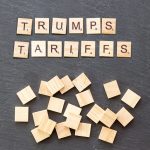Two Federal Courts Rule to Halt Trump’s Tariffs; Third Allows Tariffs to Stay in Place for Appeal
Two federal court rulings in two days decided against President Trump having the power to enact his “Liberation Day” tariffs, including the 10% baseline tariff he has placed on imports from other countries and the higher tariffs he imposed on goods from China.
Some tariffs are unaffected – like those on steel, aluminum, and automobiles – because they derive authority for tariff power from other sources than the International Emergency Economic Powers Act of 1977 (IEEPA), which these cases revolve around. The courts ruled IEEPA did not grant the president power to impose tariffs to the extent President Trump has used it to do.

Here’s how the Court of International Trade put it in its ruling:
The Constitution assigns Congress the exclusive powers to “lay and collect Taxes, Duties, Imposts and Excises,” and to “regulate Commerce with foreign Nations.” U.S. Const. art. I, § 8, cls. 1, 3. The question in the two cases before the court is whether the International Emergency Economic Powers Act of 1977 (“IEEPA”) delegates these powers to the President in the form of authority to impose unlimited tariffs on goods from nearly every country in the world. The court does not read IEEPA to confer such unbounded authority and sets aside the challenged tariffs imposed thereunder
Last week, I wrote about the Court of International Trade hearing the lawsuit from 12 states asking it to halt President Trump’s tariffs. Based on the exchanges I shared between Department of Justice lawyer Brett Shumate and the judges, I wrote I wouldn’t be surprised if the verdict went the states’ way, even that they may have some confidence in winning. I also wrote that this wouldn’t be over if the verdict went that way. The appeal process would happen right away and this case could go to the Supreme Court.
The Trump Administration said it has appealed the decision. In an Epoch Times article, Jacob Burg wrote what the administration shared with the outlet about the decision:
In response to the ruling, White House spokesman Kush Desai told The Epoch Times that “it is not for unelected judges to decide how to properly address a national emergency.”
“Foreign countries’ nonreciprocal treatment of the United States has fueled America’s historic and persistent trade deficits. These deficits have created a national emergency that has decimated American communities, left our workers behind, and weakened our defense industrial base—facts that the court did not dispute,” Desai said.
The administration’s response to the second lawsuit that went against it this week is similar, as reported today by Zach Schonfeld in an article for the Hill:
“The courts should have no role here,” White House press secretary Karoline Leavitt said at a briefing Thursday moments after the ruling came down. “There is a troubling and dangerous trend of unelected judges inserting themselves into the presidential decision-making process. America cannot function if President Trump, or any president for that matter, has their sensitive diplomatic or trade negotiations railroaded by activist judges.”
Not jumping into the debate about whether the judges’ decisions were correct or whether the rulings were swayed by politics rather than legal arguments, the decisions do undercut President Trump in his trade negotiations with other countries.
Just Friday, he used an announcement for a 50% tariff on goods from the EU to successfully spur trade talks with the group of nations. The Trump Administration’s tariff strategy is not only to create leverage in trade talks, but it’s also a key part of its plans for creating U.S. revenue: President Trump’s tariffs brought in over $22 billion in May before even reaching the end of the month.
The Trump Administration has also appealed the decision in the second court case.
For shippers, this adds one more uncertainty regarding tariffs. While the Court of International Trade halts the tariffs for the moment, I would expect the administration seek to expedite the appeal to the Supreme Court, where a decision could go in its favor, overruling the federal judges halting the tariffs.
UPDATE FOR TARIFF CLARIFICATION: With the decisions in appeal, the tariffs remain in effect for now because another federal court granted a stay (until at least June 9th) on the injunctions that would block the tariffs.





